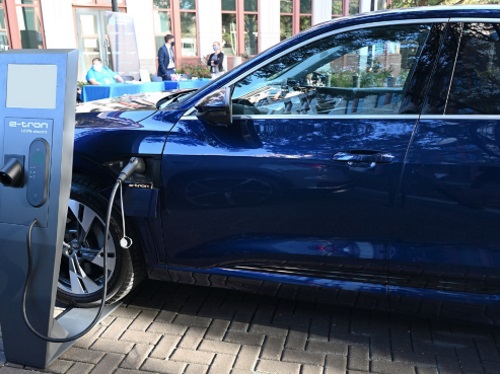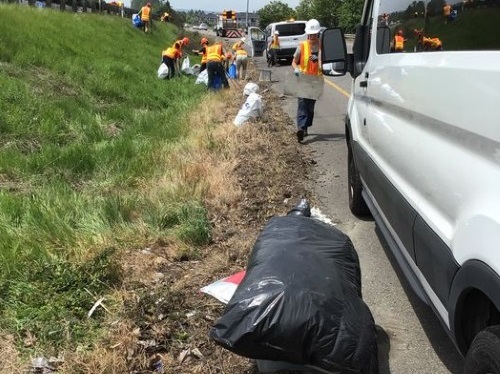FEDERAL ACTION
FHWA Approves 35 State EV Charging Infrastructure Plans – AASHTO Journal
State DOTs Increase Multimodal, Active Transportation Support – AASHTO Journal
ETAP Podcast: The Next Generation Highways Concept – AASHTO Journal
Key infrastructure nominee pitches ‘all of the above’ approach on roads – Washington Post
Will California’s Gas Vehicle Ban Help Lead the Nation? – Los Angeles Times
Inflation Reduction Act of 2022; Implementation of Energy and Infrastructure Provisions – Office of the President (Executive Order)
COVID-19
L.A. County could soon drop this key COVID mask rule. Here’s why – Los Angeles Times
NEPA
Denver passed a sales tax for climate. Is it working? – E&E News
US climate goals are achievable – if we can get the permits – The Hill (Opinion)
INFRASTRUCTURE RESILIENCE AND SUSTAINABILITY
The Growing Debate Over Where to Put EV Chargers in Rural America – Route Fifty
Port of Long Beach channel deepening project moves forward with federal, local approvals – Long Beach Business Journal
Port of Los Angeles offers $5 million in green incentives – Port Technology
Tijuana Airport’s Bridge to the U.S. Is Reshaping California-Mexico Travel – Airline Weekly
Work Progresses on Two Projects at Maine-Canada Border – Transport Topics
AIR QUALITY
The Fog of San Francisco – New York Times
Feds Launch New Climate Resilience Planning Portal – Government Technology
California’s Next Climate Mandate Is End to Sales of Diesel-Only Trucks in 2040 – Times of San Diego
Biden-Harris Administration Announces Interagency Commitment to Lower Transportation Emissions and Consumer Costs, Bolster Domestic Energy Security – US Department of Energy (Media release)
EPA Releases Final Determinations of Attainment Status for Air Quality Standards for Smog – EPA (Media release)
ENVIRONMENTAL JUSTICE
At 75, the Father of Environmental Justice Meets the Moment – New York Times
U-M study finds 1 in 4 four US adults experience transportation insecurity – University of Michigan (Media release)
Justice Department Moves to Intervene in Mobility Disability Discrimination Suit Against San Juan, Puerto Rico – Department of Justice (Media release)
NATURAL RESOURCES
A State Wildlife Agency That’s Winning at Twitter – Route Fifty
Florida scientists will study how homeowners affect the water quality of stormwater ponds – WUSF Radio
NCDOT begins second phase of biannual litter sweep, encourages volunteer participation – Daily Tar Heel
Preventing Litter Is “Simple As That,” Says New Washington Campaign – Daily Fly
CULTURAL RESOURCES
Visiting with Huell Howser: Los Angeles Union Station – KCET-TV
HEALTH AND HUMAN ENVIRONMENT/ACTIVE TRANSPORTATION
Cincinnati City Council working on long-term plan to address pedestrian safety – WXIX-TV
Gordie Howe International Bridge Will Have Access For Bicycles And Pedestrians – WLHT Radio
How The Twin Cities Is Making Transit Accessible To Immigrants And Refugees – Next City
Centering Bikes in the Future of Mobility – Planetizen
Transit App Adds Pittsburgh Bike-Rental Program POGOH – Pittsburgh Post-Gazette
TRB RESOURCES/ANNOUNCEMENTS
Navigating an Electric Vehicle Future: Proceedings of a Workshop – National Academies of Sciences, Engineering, and Medicine
Preparing for LNG by Rail Tank Car: A Readiness Review – TRB
FEDERAL REGISTER NOTICES
Enhancing the Safety of Vulnerable Road Users at Intersections; Request for Information – USDOT (Notice)
Air Plan Approval; Missouri; St. Louis Area Vehicle Inspection and Maintenance Program – EPA (Final rule)
Membership in the National Parks Overflights Advisory Group – FAA (Solicitation of applications)
Draft FAA Policy Regarding Processing Land Use Changes on Federally Acquired or Federally Conveyed Airport Land – FAA (Proposed policy; request for comments)
Uniform Procedures for State Highway Safety Grant Programs – NHTSA (Notice of proposed rulemaking)
Improvements for Heavy-Duty Engine and Vehicle Fuel Efficiency Test Procedures, and Other Technical Amendments – NHSTA (Proposed rule)
Meeting of the Regional Energy Resource Council – Tennessee Valley Authority (Notice)


